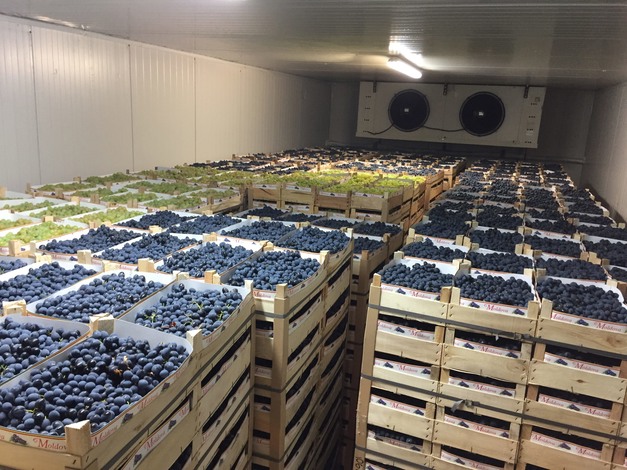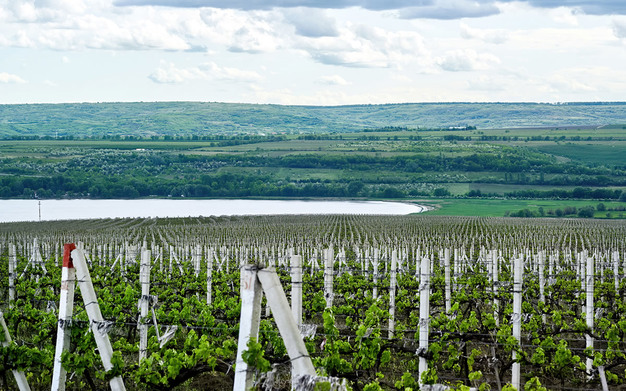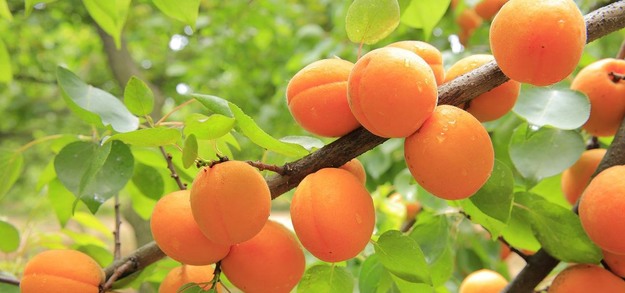With its fleet of trucks that supply the Eastern and Central European markets with its own and partner-grown fruit, export company Fani has, for the past five years, had quite a unique business model in Moldova's fruit sector.
"We're not immediately interested in the Middle East. We prefer sending our goods to the Baltic states or Austria and Germany. We can control that better," begins sales manager Stefan Bitlan.
Stefan Bitlan shows Stanley plums
Fani Ltd operates from a distribution center barely five kilometers from Moldova's capital, Chisinau. Stefan's father founded it as a logistics company shortly after the country became independent.
"He'd buy fruit from growers and export it to Russia, Belarus, Ukraine, and Romania. In 2011, I joined the team, and a few years later, we made the leap to exporting to the EU, starting with the Baltics in 2015 and Austria and Germany in 2017."

Grapes ready for export
In the first half of the year, they ship mostly stored grapes and apples to those overseas markets. "Our grapes, which are predominantly seeded, sell well in Ukraine and Romania. Our proximity means we hardly have any competition from other origins in our neighboring countries. In the second half of the year, we focus on plums and apricots. Plums account for 60% of our sales. We grow half the fruit we sell ourselves; the other half we source from partner growers. We have long-term relationships with them and help them achieve the high standards required for the foreign market, such as GlobalGAP and GRASP," says Stefan.
Fani has its own trucks
Power is nothing without control
He explains that he will not sign contracts with clients if he does not have the required fruit hanging in his orchard or in cold storage.
"For example, I have 15 hectares of Stanley plums. I like getting the products I supply from partner growers. But if something goes wrong with the delivery or quality, I can always fall back on my own products. Our staff very strictly monitors both our and our suppliers fruit quality. Power is nothing without control, I always say. We have a nice partner grower network, good relationships with multiple customers, ample cold storage, packaging lines, and even our own fleet of trucks. However, that all means nothing if we don't meticulously check every shipment's quality."

Beautiful Moldovan scenery with vineyard in the foreground (foto Fani)
Good relationships mean Moldovan products get good prices
Fani primarily focuses on direct sales to supermarket chains. "Big retailers generally have the politics of low prices that they provide to suppliers, at the same time this is the sales channel with the most sophisticated quality requirements. For most of producers in Moldova it is very difficult to maintain low semi-costs while producing a high-quality product, this is just impossible. Still, my experience is that when you have a good relationship with a retail customer, they apply the same price to produce, whether it comes from Serbia, Germany, or Moldova," continues Stefan.
Novatec's sorting line for apples and plums
In one of this Chisinau-based fruit export company's main markets - Germany - the local retailers' support for locally-grown produce is an obstacle for Fani's activities while German product is available.
"And that's not even at the government's behest; it's just the local mentality. During the German season, even our superior taste quality cannot stand up to the proximity argument. Things are a little different in Moldova, so we actually face a two-pronged issue. Sometimes the Moldovan chains will opt for foreign produce - from Poland, for example - if it's offered cheaper, even if our cold stores are full of fruit. Fortunately, our plums usually end up in empty overseas markets."
Plums are very popular in the German-speaking part of Europe
More than just Stanley
They usually begin harvesting the early plum varieties, Cacanska Rana and Cacanska Lepotica, in mid-July. They export only modest volumes of these because the Central European countries have an ample supply of locally-grown products.
"That was particularly noticeable this year, given the high production throughout Europe, not only of plums but of apricots and tart cherries too," says Stefan, who is particularly excited about Centenar, the slightly later, native to Moldova and Romania variety. "These have the same size, color, and appearance as Lepotica," the sales manager says.
"But where Lepotica is harvested with a Brix value of 12, Centenar easily reaches 20. You could consider it candy. We're especially active in the Baltic market with this product. We start picking Cacanska Najbolja and Stanley plums in early September. The harvest is large, but a significant part is first placed in the cold storage while Poland still has cheaper plums on the international market. The demand for our plums peaks between September 20 and October 20 and then calms down again. The last trucks with product from CA storage leave around December 20."
All posing in front of the cooling trailer
Grapes to Riga
Before Fani became active in the German-speaking markets, it gained its first export experience outside of the usual destinations (Russia, Belarus, Ukraine, and Romania) in the Baltic states.
"I got the contact information of an import company in Riga (Latvia) from a customer in Belarus. I immediately called them and explained that I had delicious plums and grapes. Even though the Moldovan market wasn't bad at that time - grapes fetched €0.75/kg - and even though they told me they couldn't pay more than €0.75 for shipment, I went ahead," Stefan remembers.

Big in apricots
"Having our own fleet gave us some leeway to bear the transportation cost ourselves. The grapes arrived, were well-met, sorted, and … unexpectedly; we received a claim for €4,000. I had an immediate headache. But in February 2016, I met the importers at Fruit Logistica, and that same year - which, by the way, was a bad one on the Russian market - I managed to send 40 truckloads to Riga. Ditto in 2017. By then, that few-thousand euro claim was long forgotten."
"We still export to Latvia, though it currently takes longer to get there. Instead of going through Ukraine and Belarus, we have to detour via Romania, Hungary, Slovakia, Poland, and Lithuania. But it's still worth the effort. We won't easily abandon the good relationships we've built in recent years in both the Baltic States and Germany. The spot market holds no attraction for us; we work for the long term," concludes Stefan.
For more information:
Stefan Bitlan (sales manager)
Fani Ltd
str. Alecu Russo 43
4829 Magdacesti (Criuleni) - Moldavië
Mob: +373 6969 1990
Mob: +40 722 466 800 (Roemenië)
[email protected]
www.fani.md










